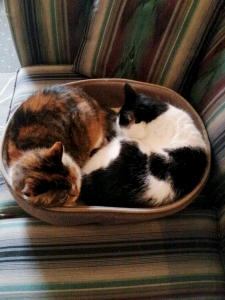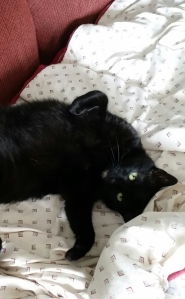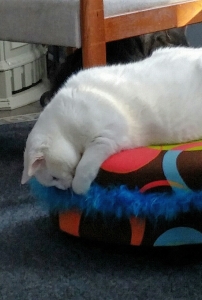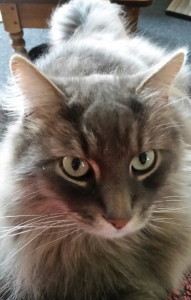DOGS, DOGS, DOGS… we are always talking about our wonderful canine friends. Heartworm prevention, flea/tick prevention, vaccinations, joint support the list goes on and on.
Now it is time to speak about our wonderful FELINES and shine the spotlight on them for a change.
Cats, most of us have one. Some of us may have two or more.
Living with our feline friends is totally different to living with our canines. Those who have both definitely know there is a difference.
Cats may act like dogs. Happily greeting us at the door. Trotting cutely in front of us. Showing us the way to the kitchen, just in case we have forgotten where it is. Getting under foot while we are busily trying to do our everyday chores. Showing affection in all forms. Which includes: head bunting, kneading, purring, licking, drooling, gentle hand biting, brushing up and rubbing their bodies next to ours or just laying there watching us with that “I love you” look on their face. Sharing our couch or lap at tv time. Sharing our bed at the end of the day. Stealing the pillow and laying on our head. BUT there is a difference.
We can read dogs much better than cats when something is just not right. It could be their body language. Feeding time. Play time. Dogs are better at communicating “Hey, I don’t feel well.” When that happens what do we do? We whisk them off to the vet. No questions asked. Something is not right and we are worried.
Cats on the other hand, lets say have a built-in mechanism that prevents them from saying I don’t feel well. They do not like to admit that something is wrong. They are excellent in disguising their feelings and prefer to just carry on as if nothing is wrong. Prime example, they go to jump onto a table and miss. They hit the ground and in most cases not in a very graceful way. Then amazingly jump right up, lick their paw or shoulder and walk away as if to say I meant to do that and you better not laugh. We all have seen it. I must admit, I have laughed.
 We may have noticed they are not around as much or are hanging out in a different area of the house but they seem fine so, no concerns there. Their coat does not look as shiny but they are eating, drinking and using the litter. So I guess they are ok. We may see small changes but, all in all, they seem fine. We now walk over to them with some concern. “You ok”? They stand up stretch and flop over for a belly rub. Seeing them do this we feel better. You’re fine we tell ourselves. Yup fooled again. The master of disguise is at work. NO something is not right!
We may have noticed they are not around as much or are hanging out in a different area of the house but they seem fine so, no concerns there. Their coat does not look as shiny but they are eating, drinking and using the litter. So I guess they are ok. We may see small changes but, all in all, they seem fine. We now walk over to them with some concern. “You ok”? They stand up stretch and flop over for a belly rub. Seeing them do this we feel better. You’re fine we tell ourselves. Yup fooled again. The master of disguise is at work. NO something is not right!
This brings me around to annual physical exams.
Yes, even if they are indoor cats they should be seen at least once a year. More if their behaviour changes. This is the time when something serious could be lurking in the background and may be found during an exam. Our veterinarians are experts in looking for problems. They know what questions to ask that may indicate something that we have not seen. A thorough examination is done, they will decide if further work up is required and make recommendations. Annual blood work should be done. Even if the cat seems to be doing fine. This will give an excellent baseline to compare with, if tests are required at a later date. Cats by law should be vaccinated for rabies. Yes, indoor cats can come in contact with bats, as bats have been known to get into the house. What could be more exciting for a cat than a mouse with wings.
Bringing cats to the veterinary hospital can be stressful. Cats do not like carriers, even though that is the safest way to transport them. Car rides are definitely not on their to-do-list either. You hate to see them so worked up. Stress can be reduced with Feliway products. These are synthetic feline pheromones that come in wipes and sprays that can be used in carriers and the car. These pheromones are calming for cats and can reduce stress. When arriving to the vet clinic ask the receptionist to please put you in an exam room where it is quiet and away from dogs. Doing this can make the travel and visit much more pleasant for the two of you.
I can not stress the importance of annual exam for all our felines. This could help prevent a very serious illness. Cats can develop heart issues that the family does not now about and can be detected by a veterinarian. Sadly these can be silent killers if not diagnosed and treated early. Older cats may have thyroid or kidney issues. Again something that can only be diagnosed and treated by a veterinarian. It is a great time to discuss weight management and joint support for seniors or any other questions and concerns. 
I keep a watchful eye on all my feline furbabies. But always remembering there could be a ‘Master of Disguise’ in the group. I rely heavily on our veterinarians to keep my crew in purrfect purring harmony with annual exams and full work ups.
Thank you for taking the time to read my blog and if we have not already seen you this year, we look forward to meeting your feline furbaby.
Donna

